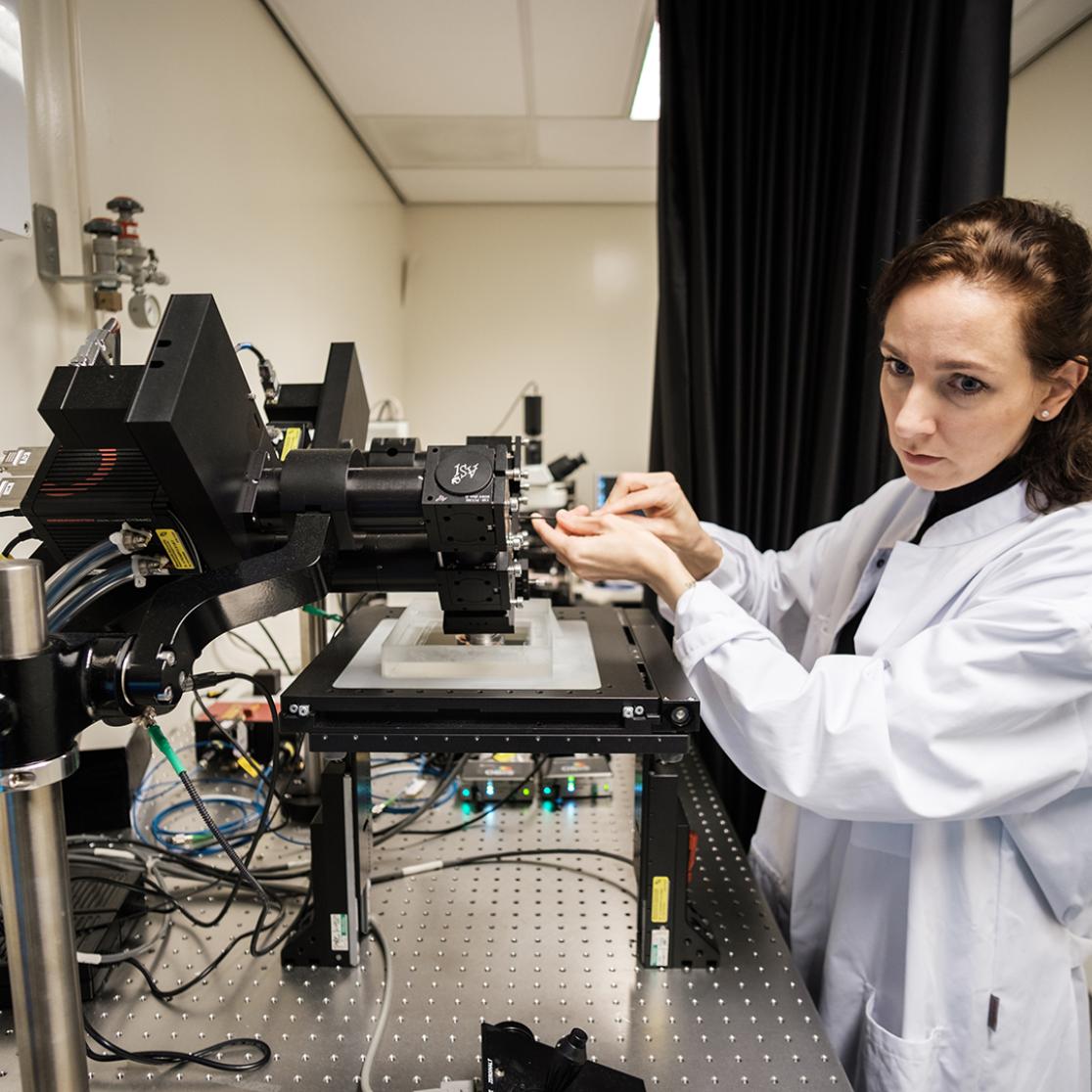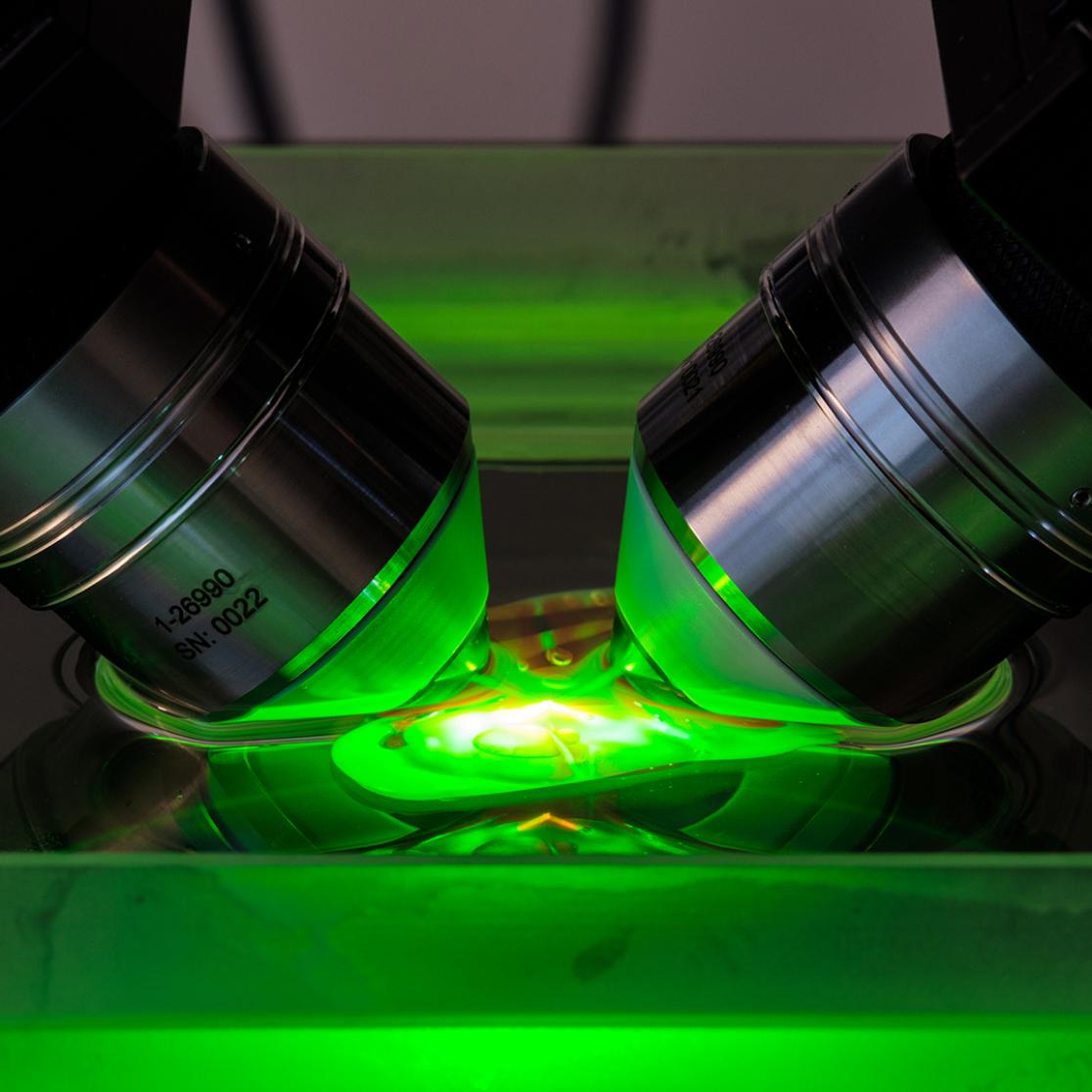Anna Schueth, Illuminating the unseen with novel 3D microscopy technology
Anna Schueth (Department of Cognitive Neuroscience, Faculty of Psychology and Neuroscience) is a post-doctoral researcher, who recently received a NWO VENI grant to further develop and apply her ground-breaking, light-sheet microscope prototype, which she co-developed and set up in the lab at Maastricht University. "When I first built it in the lab at MHeNs, it was the first prototype worldwide and now, 3 or 4 exist in the world", says Schueth. Maastricht University is fortunate to have this cutting-edge microscope and to apply this novel 3D imaging technology to various human and rodent tissue samples. "I am very proud to have received the only NWO grant in the Applied and Engineering Sciences (AES) domain at Maastricht University this year and I strongly believe that technological advances are vital for UM and its many different research projects".
Belief
The issue with ground-breaking ideas is that they deviate from ‘the norm’. Schueth had to overcome a lot of obstacles, but she never stopped believing in "her" microscope and what it could do. In short: Schueth’s microscope can look at very large tissue samples of healthy, and unhealthy, human brain in 3D very fast. ‘The norm’ is to look at paper-thin sections of human brain tissue, Schueth can look at samples, which are at least 50 and up to 1000 times thicker. This allows her to look at entire brain areas and networks in 3D, which was simply not possible before the development of this technology. I will apply this technology to brain samples from Alzheimer`s disease and Vascular dementia patients, which can lead to completely new insights about these diseases and that is crucial for treatment development for millions of patients worldwide".
An early start
At the age of 7, she received her first microscope from her parents. “I ran around the house and the garden to collect samples; I even kept a little lab journal. My interest in science started early and to this day I am truly amazed by microscopy. I enter a completely different world, where time doesn’t exist. I’m fascinated with seeing something that is otherwise invisible”. Her home environment always supported her academic passion, in contrast to a few teachers at school. Schueth, who is also a FEM ambassador at Maastricht University, channels this experience in her mentoring work, where she is supporting and encouraging high-school girls to follow their STEM curiosity in an online platform during the last 10 years. “One teacher or a negative comment shouldn’t stop you from following your dream and if you have a true passion for something: Go for it”.

Microscopy to the next level
Now, Schueth is taking microscopy to the next level for brain and cancer research. Her technology will aid researchers in analysing entire human brain areas and prostate cancer biopsies in one go. “If you want to look at specific large areas in the human brain, using classical methods, you’d have to use hundreds of tiny slices of that area. Also, you would destroy valuable information, such as large 3D brain cell and vessel constructs. Now, you can examine very large pieces without actually cutting it."
Looking to the future: cancer diagnostic
Outside of doing things faster and bigger, this new technology also creates new possibilities. Together with the Departments of Pathology and Urology at the Maastricht University Medical Center (MUMC+), Schueth is looking at biopsies from prostate cancer patients. “With my new method we can scan the entire patient biopsy for tumours and that will increase the chances to detect more tumours overall". The clinicians at the hospital see many possibilities and would like to push this to a pre-clinical stage for cancer diagnostic in the future.

Two VENI interviews
Schueth obtained the VENI on her second attempt in 2020, despite working from home with two kids during a difficult year. "I wrote the VENI during my maternity leave, while taking care of my baby. That was definitely a challenge and the circumstances were not ideal. But I knew I had to try again, as I had already come so far." Schueth did her first VENI interview in 2019, the day before she went into labour with her second child and although she gave it her best, it didn’t go according to plan. "I had contractions during my interview and was literally hoping that my water would not break in the middle of the interview. It was a crazy situation but giving up was not an option for me back then, nor is it now. I know why I am doing my work and I believe in it and its future applications 100 percent. With the VENI and further funding in the future I will expand this technology, as this is only the beginning for many great endeavours to come".
Also read
-
Teacher Information Points at UM
UM faculties now host Teacher Information Points (TIPs) that offer local, “just-in-time” and on-demand support for teaching staff. The aim is simple: to provide help that is closely connected to day-to-day teaching practice.

-
Dongning Ren awarded ERC grant for her research proposal on ostracism.
FPN colleague Dr. Dongning Ren was awarded a highly competitive ERC grant for her project: Using a principled causal approach for causal queries: the Ostracism Causal Project.

-
